
The 1972 United States presidential election was the 47th quadrennial presidential election held on Tuesday, November 7, 1972. Incumbent Republican president Richard Nixon defeated Democratic U.S. senator George McGovern in a landslide victory. With 60.7% of the popular vote, Richard Nixon won the largest share of the popular vote for the Republican Party in any presidential election.

From February 10 to June 9, 1992, voters of the Democratic Party chose its nominee for president in the 1992 United States presidential election. Despite scandals and questions about his character, Arkansas Governor Bill Clinton won the nomination through a series of primary elections and caucuses culminating in the 1992 Democratic National Convention held from July 13 to July 16, 1992, in New York City. Clinton and Tennessee Senator Al Gore were nominated by the convention for president and vice president, respectively.
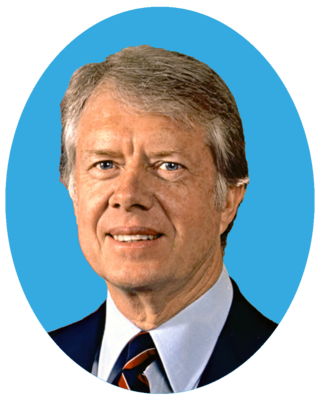
The 1976 Democratic National Convention met at Madison Square Garden in New York City, from July 12 to July 15, 1976. The assembled United States Democratic Party delegates at the convention nominated former Governor Jimmy Carter of Georgia for president and Senator Walter Mondale of Minnesota for vice president. John Glenn and Barbara Jordan gave the keynote addresses. Jordan's keynote address made her the first African-American woman to deliver the keynote address at a Democratic National Convention. The convention was the first in New York City since the 103-ballot 1924 convention.
Richard Nixon served as the 37th president of the United States from 1969 to 1974. He previously served as the 36th vice president of the United States from 1953 to 1961, and as a United States senator from 1950 to 1953 and United States representative from 1947 to 1950.

Electoral history of Jimmy Carter, who served as the 39th president of the United States (1977–1981) and the 76th governor of Georgia (1971–1975).
Hubert Horatio Humphrey served as the 38th Vice President of the United States (1965–1969), as a United States senator from Minnesota, and as the 35th mayor of Minneapolis, Minnesota (1945–1948).

Electoral history of Ted Kennedy, United States Senator from Massachusetts (1962–2009) and, at the time of his death, the second most senior member of the Senate.

Electoral history of Walter Mondale, who served as the 42nd vice president of the United States (1977–1981); as a United States senator from Minnesota (1964–1976), and as the 23rd attorney general of Minnesota (1960–1964).

Electoral history of Robert Byrd, senior United States senator from West Virginia (1959–2010), president pro tempore of the United States Senate, Senate majority and minority leader (1981–1987). He was also the longest-serving U.S. senator in history, as well as the previous longest-serving member of Congress.

Electoral history of Mike Gravel, Speaker of the Alaska House of Representatives (1965–1966), United States Senator from Alaska (1969–1981), candidate for the 1972 Democratic Party Vice Presidential nomination and 2008 Democratic and later Libertarian Presidential nomination

Electoral history of Lyndon B. Johnson, who served as the 36th president of the United States (1963–1969), the 37th vice president (1961–1963); and as a United States senator (1949–1961) and United States representative (1937–1949) from Texas.

Electoral history of George Wallace, 45th governor of Alabama, 1968 American Independent Party presidential nominee and candidate for 1964, 1972 and 1976 Democratic Party presidential nomination

This is a list of results for elections in which Daniel Inouye, a Democrat. He was elected Hawaii's first U.S. Representative in 1959, and was first elected to the U.S. Senate in 1962. He served until his death in 2012. Inouye is the 2nd longest-serving senator in history.
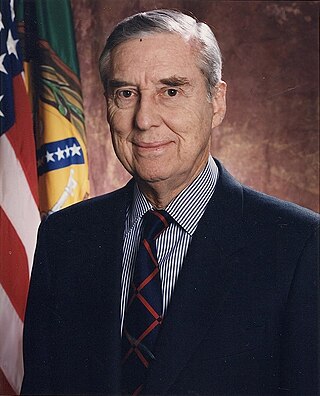
Electoral history of Lloyd Bentsen, United States Senator from Texas (1971-1993), United States Representative (1948-1955), United States Secretary of the Treasury (1993-1994), Democratic Party nominee for Vice President of the United States in 1988 and a candidate for 1976 Democratic presidential nomination
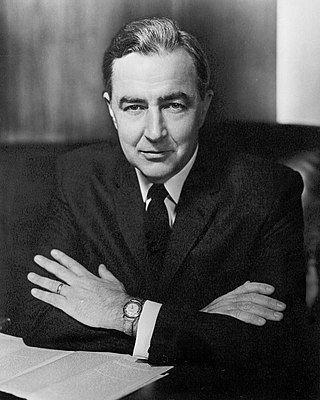
Electoral history of Eugene McCarthy, United States Senator (1959–1971) and Representative (1949–1959) from Minnesota. He was a member of the Minnesota Democratic-Farmer-Labor Party.
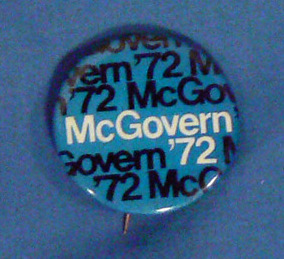
The George McGovern 1972 presidential campaign began when United States Senator George McGovern from South Dakota launched his second candidacy for the Presidency of the United States in an ultimately unsuccessful bid to win the 1972 presidential election against incumbent president Richard Nixon, winning only in the District of Columbia and the state of Massachusetts. McGovern vied to become the first South Dakota native to become president.
Since 1983, the Democratic Party of the United States holds a few debates between candidates for the Democratic nomination in presidential elections during the primary election season. Unlike debates between party-nominated candidates, which have been organized by the bi-partisan Commission on Presidential Debates since 1988, debates between candidates for party nomination are organized by mass media outlets.
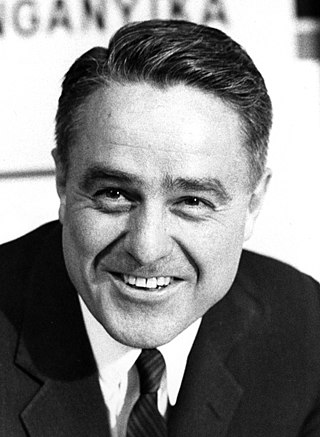
This article lists those who were potential candidates for the Democratic nomination for Vice President of the United States in the 1972 election. Coming into the 1972 Democratic National Convention, South Dakota Senator George McGovern had the delegate lead, but did not have the presidential nomination locked up. After winning the Democratic nomination for president on July 13, McGovern looked for a running mate. McGovern's first choice for vice president was Ted Kennedy, but Kennedy refused to join the ticket; Minnesota Senator Walter Mondale, Wisconsin Senator Gaylord Nelson, and Connecticut Senator Abraham A. Ribicoff also declined. McGovern offered the position to Missouri Senator Thomas Eagleton, who appealed to labor groups and Catholics, two groups that McGovern had alienated during the primary campaign. The ticket of McGovern and Eagleton was nominated by the 1972 Democratic National Convention. Following the convention, it was revealed that Eagleton had received treatment for depression in the 1960s. Though McGovern considered keeping Eagleton on the ticket, he ultimately chose to replace Eagleton with former ambassador Sargent Shriver. The McGovern–Shriver ticket lost the presidential election to the Nixon–Agnew ticket. After the controversy surrounding Eagleton, future campaigns spent much more time vetting vice presidential candidates.

The 1972 United States Senate election in South Dakota took place on November 7, 1972, concurrently with the U.S. presidential election as well as other elections to the United States Senate in other states as well as elections to the United States House of Representatives and various state and local elections.

The 1974 United States Senate election in South Dakota was held on November 5, 1974. Incumbent Democratic U.S. Senator George McGovern, who had lost the 1972 United States presidential election to Richard Nixon ran for reelection to a third term and won, despite having also lost his home state two years prior.





















